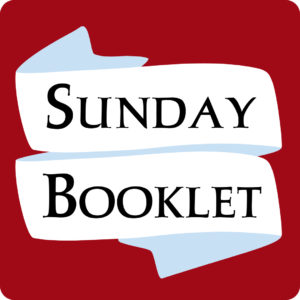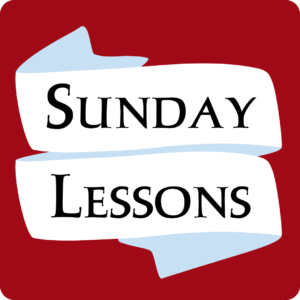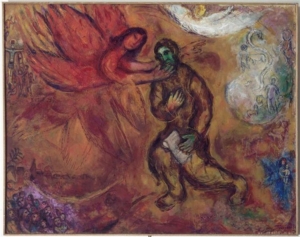Worship Guide for February 9, 2025
Like TV Guide, but from God! Find the text of the Prayers of the People and Sermon below. Use the buttons provided to find other worship materials.
To see the Worship Guide for other weeks, click here.
Prayers
Weekly Prayer List Recording:
Prayers of the People (Sunday):
The response to the bidding, “Lord of all life,” is “Hear us.”
Lord in time and space: give us courage and persistence to hold fast to the hope that is within us in a world increasingly deaf to the values and expectations of your kingdom. Lord of all life, Hear us.
We pray for the Church and her life: For Sean, Presiding Bishop, and Nicholas, our bishop; for Hosam, Archbishop of Jerusalem, remembering the pastoral outreach of the Diocese of Jerusalem among a sorely oppressed Palestinian Community; for Pope Francis; for Bartholomew, Ecumenical Patriarch, and other Christian leaders. Lord of all life, Hear us.
We pray for the world and its pressing needs: We continue to pray for peace with justice to come to the Holy Lands of Israel, Palestine, Lebanon giving thanks for the cease fire in Gaza and the return of Gazans hitherto displaced by the war. We pray for Syria, for Ukraine, for Sudan and an end to the conflicts in sub–Saharan Africa. In our own land we pray for all who are increasingly afraid in a time of intense polarization.
In our own land we pray for those in immigrant communities who are increasingly afraid in a time of intense persecution; we remember with urgency at this time Dorcas International and other refugee resettlement agencies grappling with the consequences of the snap withdrawal of funding. We pray for all civil servants working in agencies and departments of the US Govt, for those in the private sector dependent on federal funding, and for all consumed by worry for loved ones and families at this time.
We pray for the speedy reestablishment of constitutional government norms guided by the rule of law. Lord of all life, Hear us.
We remember the earth, our increasingly fragile island home: We pray for a US return to the Paris Agreement on Climate Change. We pray for a strengthening of the emergency services and necessary infrastructure to meet the unprecedented challenge of increasing climate instability. Lord of all life, Hear us.
We pray for all in need: for those whose strength is failing through ill health; whose spirits are flagging through depression; whose determination is being sapped through addiction; that they might know God’s comforting presence and healing.
We remember with love those who have asked for our solidarity in prayer: Mary, Sam, John, Raya, Larry, Jami, Haleigh Leigh, and others we name. Lord of all life, Hear us.
We pray for our own needs, together with those nearest and dearest to us, remembering especially those celebrating birthdays this week: Beth Shearer, John Brooks, Jock Knowles, Eleanor Summerhill, and David Blake. Lord of all life, Hear us.
Rejoicing in the fellowship of so great a cloud of witnesses, we remember those we love but see no longer, especially: Those we name. We remember those experiencing loss. Lord of all life, Hear us.
Celebrant adds a concluding collect.
It’s not defeat we should fear but failure
The Rev. Mark Sutherland
We speak out and risk defeat yet even in the face of defeat we remain undaunted for the fire-ravaged stump of the tree still contains the seeds of future fruitfulness. No, it’s failure we should fear. Failure lies simply in the refusal of God’s call for us to speak truth to power and folly to the foolish.
Then I said, “How long O Lord?” And he said: ” Until cities lie waste without inhabitant, and houses without people, and the land utterly desolate; vast will be the emptiness in the midst of the land.”
Normally, my alarm is set for 5 am – which at this time of the year seems an indecently early time to awaken – greeted by the cold and dark of a winter’s morning. Even if my 5 am alarm does not go off, Mable Rose, my 2-year-old English Cocker Spaniel has her own mysterious time clock which she signals to me by moving from the foot of the bed where she’s slept peacefully through the night to sitting as close to my face as she can get with tail wagging. The intensity of her quiet staring penetrates my attempt to fake sleep by keeping my eyes closed. She knows. I know she knows. What’s even more uncanny is that she knows that I know she knows I’m faking it.
Yet, in these past few weeks, it seems that a 5 am alarm is no longer necessary. For some weeks now, my equivalent to Mable Rose’s internal alarm clock seems stuck at 3 am when suddenly wide awake I begin another cycle of rumination on the all-consuming state of the nation and the world. Even conscious efforts and evasive actions to filter out the deluge of noise masquerading as news – fail to keep troubling thoughts and painful feelings at bay. A sense of profound unease so pervades our cultural spaces that by osmosis it seeps into neurocircuits and body cells alike.
In the modern world of the all-consuming 24/7 news cycle, the prophetic words from T.S. Eliot’s Choruses from The Rock sound:
The Eagle soars in the summit of Heaven.
The Hunter with his dogs pursues his circuit…
The endless cycle of idea and action,
Endless invention, endless experiment,
Brings knowledge of motion, but not of stillness;
Knowledge of speech, but not of silence;
Knowledge of words, and ignorance of the Word.
Today, Eliot’s soaring eagle becomes a reference to the 24-hour surveillance culture, and the hunter with his dogs a reference to the draconian actions of immigration and customs agents – hunting down frightened immigrants.
The worry awakening me at 3 am – which then cycles endlessly until at day’s end sleep once again offers a brief few hours of respite – is deeply personal. New worries challenge the illusion of overlap between assumed shared societal values and my Christian-shaped conscience. Yet, my worry is also born of empathy for those to whom I am both a priest and pastor. This is the worry I see etched on the faces of some who fear the withdrawal of funding will affect their own livelihood. I see it on the faces of aging parents consumed with worry for their adult children who have chosen careers in government agencies from USAID to the forestry service, not to mention the intelligence and federal law enforcement agencies.
Government is so much more complex than running a tech company or social media platform. So much of it remains invisible to the naked eye until – that is – services taken for granted cease to function. Increasingly this reality will come as an unexpected surprise to those who have little idea of the extent to which their lives are impacted by the immanent disappearance of government services, structures, and protections.
On Friday I attended a Dorcas International – one of Rhode Island’s three refugee resettlement agencies – webinar update on the chaos affecting RI refugee resettlement agencies struggling to make sense of how to keep operating following the immediate cancelation by executive fiat of across-the-board funding for the legal resettlement of refugee programs. As a Dorcas long-term community partner, for St Martin’s this dire situation is of particular concern to us.
My reference to Eliot is so much more than the predilection for the poetic mind. It’s an attempt to find words strong enough to frame a description of current reality. Eliot’s words frame the current dilemma consuming us. He notes that:
All our knowledge brings us nearer to our ignorance,
All our ignorance brings us nearer to death,
But nearness to death no nearer to God.
Eliot asks:
Where is the Life we have lost in living?
Where is the wisdom we have lost in knowledge?
Where is the knowledge we have lost in information?
He concludes:
The cycles of Heaven in twenty centuries
Bring us farther from God and nearer to the Dust.
In the OT lesson on the fifth Sunday after Epiphany we hear of the call of the prophet Isaiah – the first of three to be known by this name. We are ushered into his powerful mystical encounter with the radiant glory of the divine presence in the form of a robe filling the whole temple and shaking the very foundations. The divine presence is surrounded by the six-winged seraphim – not pudgy cheeky cherubs – but fierce and frightening angelic beings deafening this man of unclean lips living among a people of unclean lips with their repetitive chorus of Holy, Holy, Holy is the Lord of heaven and earth.
It is significant that Isaiah accurately dates his mystical encounter with the divine presence in the year that King Uzziah died. Uzziah, also known as Azariah, reigned in Judah from approximately 792 to 740 BCE. Ascending the throne at a young age, around 16, following the death of his father, King Amaziah his reign is noted for both his military successes and his ambitious building projects, contributing to a period of prosperity for Judah.
However, his reign was not without challenges when eventually his pride led him to overstep his boundaries. He attempted to burn incense in the Temple, a duty reserved exclusively for the priests. When confronted by the high priest and other priests, he became enraged. Struck with leprosy as a consequence of his actions, Uzziah was forced to live in isolation, with his son Jotham managing the kingdom’s affairs for the remainder of his life.
It’s curious that the call of Isaiah comes at a pivotal moment in Judah’s political history. Uzziah is remembered for both his accomplishments and his tragic downfall, and he serves as a cautionary tale about the dangers for any ruler who allows pride to overstep legitimate authority. Let those who have ears to hear- listen!
Isaiah is given a mandate to speak God’s truth to power, and God’s rebuke to a people’s collective folly. But God it seems has no illusions about the likelihood of Isaiah’s success in speaking to a people who in listening do not comprehend, who in looking do not understand – whose minds are clouded, whose ears are stopped, and whose eyes are shut, who fail to recognize the urgency of the moment facing them.
Isaiah asks how long O Lord? In an allusion to future exile, the Lord tells him that things must run their course until cities lie waste without inhabitants, houses without people, and the land utterly desolate – vast will be the emptiness in the midst of the land. Yet like the stump of a burned tree, the seeds of new growth will survive.
Jesse Zink – in Faithful, Creative, Hopeful: Fifteen Theses for Christians in a Crisis-Shaped World – the text chosen for our Lent 2025 Tuesday evening book study, draws out a crucial yet misunderstood distinction between defeat and failure, which we do well to remember in these days. In these days, as the bearers in our time and place of God’s timeless message to the world – the forces that rule our society by the laws of self-interest will always conspire to defeat the message of truth. But as the Lord counsels Isaiah it’s not defeat he should fear but failure.
Eliot reminds us:
The world turns and the world changes,But one thing does not change.
In all of my years, one thing does not change.
However you disguise it, this thing does not change:
The perpetual struggle of Good and Evil.
There is a price to be paid for singing “Holy, Holy, Holy Lord God Almighty” in the face of an oppressive force that thinks otherwise. Amidst challenges, anxieties, failures, disappointments, discouragement, and loss, our awareness of the sovereignty of God’s transformative expectations for the coming of the kingdom empowers us to face defeat at the hands of the conspiracy of power ranged against us. However, defeat is not the same as failure. We speak out and risk defeat yet even in the face of defeat we remain undaunted for the fire-ravaged stump of the tree still contains the seeds of future fruitfulness. No, it’s failure we should fear. Failure lies simply in the refusal of God’s call for us to speak truth to power and folly to the foolish!





